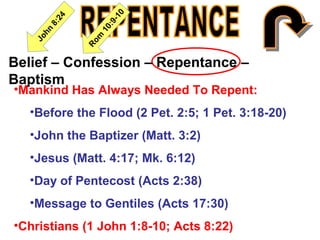Repentance
- 1. Belief â Confession â Repentance â Baptism âĒMankind Has Always Needed To Repent: âĒBefore the Flood (2 Pet. 2:5; 1 Pet. 3:18-20) âĒJohn the Baptizer (Matt. 3:2) âĒJesus (Matt. 4:17; Mk. 6:12) âĒDay of Pentecost (Acts 2:38) âĒMessage to Gentiles (Acts 17:30) âĒChristians (1 John 1:8-10; Acts 8:22)
- 2. Produced by Godly Sorrow: âNow I rejoice, not that you were made sorry, but that your sorrow led to repentance. For you were made sorry in a Godly manner, that you might suffer loss from us in nothing. For Godly sorrow produces repentance leading to salvation, not to be regretted; but the sorrow of the world produces death. For observe this very thing, that you sorrowed in a Godly manner: What diligence it produced in you, what clearing of yourselves, what indignation, what fear, what vehement desire, what zeal, what vindication! In all things you proved yourselves to be clear
- 3. Fruits = Reformation of Life âbut declared first to those in Damascus and in Jerusalem, and throughout all the region of Judea, and then to the Gentiles, that they should repent, turn to God, and do works befitting repentanceâ (Acts 26:20). Matt. 21:28-32 Luke 3:7-14
- 4. âĒNinevites (Jonah 3:8-10) âĒThessalonians (1 Thess. 1:9) âĒZaccheus (Lk. 19:8-9) âĒDavid (2 Sam. 12:13; Ps. 51:1-4) âĒPeter (Matt. 26:69-76; Acts 2:14, 37; Gal. 2:14; 2 Pet. 3:15)
- 5. âĒSaul (1 Sam. 15:25) âĒCities of Galilee (Matt. 11:20-24) âĒJudas (Matt. 27:3-5)
- 6. âĒConfessing Sin âĒReturning To Services âĒRemorse or Just Being Sorry âĒJust A Reformation of Life
- 7. Convicted of Sin Sorrow in a Godly Manner Repentance: Change of the Will Fruits of Repentance Follow






